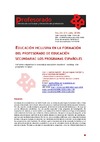Please use this identifier to cite or link to this item:
https://accedacris.ulpgc.es/jspui/handle/10553/75018
| Title: | Educación inclusiva en la formación del profesorado de educación secundaria: Los programas españoles | Other Titles: | Inclusive education in secondary education teachers' training: The programs in Spain | Authors: | García-García, Fran J. López-Torrijo, Manuel Santana Hernández, Rafael |
UNESCO Clasification: | 5803 Preparación y empleo de profesores | Keywords: | Curriculum Educational Policy Inclusive Education Secondary Education Spain, et al |
Issue Date: | 2020 | Journal: | Profesorado | Abstract: | Secondary education has been identified as a barrier to achieve the real and effective inclusion of all students. Teacher education is crucial for achieving inclusive education. Therefore, our study analyzes training programs in Spain (64 masters). According to the statistical differences, it has been possible to answer three research questions. In response to the first one, the sector (public or private) of the offer does not influence the training on inclusive education that future teachers receive. Regarding the second question, a significant influence has been found on the offer due to the presence of the educational guidance pathway, which not all programs include. Finally, the contents codified on inclusive education based on the academic guides or projects have been consistent in contrast with the requirement of the competences on inclusion. The supra and international nature of the training gaps in the case of secondary education teachers is one of the main topics of discussion throughout the text. It has been also discussed the briefness of the programs, how the educational guidance pathway has influenced the programs in Spain, the relevance of inclusion in secondary education, and the practical and curricular implications of the study. La educación secundaria ha sido identificada como un obstáculo para lograr la inclusión real y eficaz de todo el alumnado. La formación del profesorado es crucial para alcanzar dicha educación inclusiva. Por ello, nuestro estudio analiza los programas de formación en España (64 titulaciones). De acuerdo con las diferencias estadísticas, ha sido posible responder a tres preguntas de investigación. En respuesta a la primera, el sector (público o privado) de la oferta formativa no influye en la formación sobre educación inclusiva que reciben los futuros profesores. Respecto a la segunda pregunta, se ha hallado una influencia significativa en la oferta debida a la presencia del itinerario de orientación, que no todas las titulaciones ofrecen. Por último, los contenidos codificados sobre educación inclusiva en base a las guías o proyectos docentes han resultado consistentes en contraste con la exigencia de las competencias sobre inclusión. El carácter supra e internacional de las carencias formativas en el caso del profesorado de educación secundaria es uno de los principales temas de discusión a lo largo de todo el texto. También se discuten la brevedad de los programas, cómo ha influido hasta ahora el itinerario de orientación educativa en España, la importancia de la inclusión en la educación secundaria y las implicaciones prácticas y curriculares del estudio. |
URI: | https://accedacris.ulpgc.es/handle/10553/75018 | ISSN: | 1138-414X | DOI: | 10.30827/PROFESORADO.V24I2.14085 | Source: | Profesorado [ISSN 1138-414X], v. 24 (2), p. 270-293 |
| Appears in Collections: | Artículos |
SCOPUSTM
Citations
4
checked on Jun 8, 2025
WEB OF SCIENCETM
Citations
6
checked on Jun 8, 2025
Page view(s)
652
checked on Jan 18, 2025
Download(s)
620
checked on Jan 18, 2025
Google ScholarTM
Check
Altmetric
Share
Export metadata
Items in accedaCRIS are protected by copyright, with all rights reserved, unless otherwise indicated.
